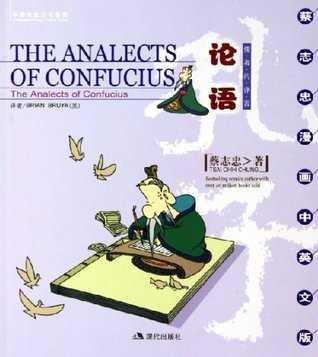Explore the World's Best Ideas
Join today and uncover 100+ curated journeys from 50+ topics. Unlock access to our mobile app with extensive features.
Intro
We're going old school on this one.
Believed to be rockin' it in the 5th/6th centuryBCE (around the same time as Lao Tzu and Buddha), Confucius was super passionate about learning and developing himself into the best person he could be according to the dictates of his classic society.
I think you'll appreciate the mining I've done for us and trust you'll enjoy this quick tour of the classic book!
2
32 reads
Let There Be No Evil In Your Thoughts
"The Master said, If out of the three hundred songs I had to take one phrase to cover all my teachings, I would say 'Let there be no evil in your thoughts."
Nice.
As it turns out (and as you know if you've read many of these Notes), this theme is echoed across the literature.
The first words of one of the core texts of Buddhism. The Dhammapada (see Notes), tell us the same thing: "Our life is shaped by our mind; we become what we think."
3
17 reads
-
While Marcus Aurelius (see Notes on Meditations) advises us to watch how we're soaking our mind: Your mind will be like its habitual thoughts; for the soul becomes dyed with the color of its thoughts. Soak it then in such trains of thoughts as, for example: Where life is possible at all, a right life is possible."
And, Shakespeare tells us that nothing is good or bad, but thinking makes it so and Wayne Dyer tells us that when we change the way we look at things, the things we look at change.
So, how's your mind? Are you letting "evil thoughts" cruise around in there unchecked?
2
24 reads
Recognizing Merit
"The Master said, (the good man) does not grieve that other people do not recognize his merits. His only anxiety is lest he should fail to recognize theirs."
Love that.
Where's your focus?
Are you frustrated people aren't seeing your wonderful qualities?
How about we shift that around a bit and only allow anxiety to arise if WE fail to see the merits of others? (Interestingly, my gut is that as we fully make that switch others are a LOT more likely to see our good qualities as well, eh? :)
3
11 reads
Doing The Things That Need To Be Done
"The Master said, He does not mind not being in office; all he minds about is whether he has qualities that entitle him to office. He does not mind failing to get recognition; he is too busy doing the things that entitle him to recognition."
"He does not mind failing to get recognition: he is too busy doing the things that entitle him to recognition."
Do you feel like you deserve more recognition in some aspect of your life?
2
10 reads
-
What might happen if you took that energy you're spending being upset/frustrated about not getting recognition and simply DID the things that would unquestionably entitle you to recognition?
(My hunch is it'd be good. :)
So I say we follow the Master's mojo and focus our energy on what needs to be done. :)
2
11 reads
I Can Always Be Certain Of Learning
"The Master said, In the presence of a good man, think all the time how you may learn to equal him. In the presence of o bad man, turn your gaze within!"
Love it.
Confucius says it another way as well: "The Master said, Even when walkin in a party of no more than three I can always be certain of learning from those ! am with. There will be good qualities that I can select for imitation and bad ones that will teac me what requires correction in myself."
Isn't that a great approach?
If we let it be, life is our classroom rich wit opportunities to expand our perspective and develop our consciousness.
2
10 reads
-
So, the next time we're in the company of someone who we find a little less than inspiring, rather than criticize or get irritated, let's see if we can see how WE have those same qualities we find offensive in others and do some work on correcting them within ourselves, shall we?!? :)
And, of course, let's see how we can develop those admirable qualities we find in others as well!
2
8 reads
50 Years Of Study Would Do It
"The Master said, Give me a few more years, so that I may have spent a whole fifty in study, and believe that after all I should be fairly free from error."
It's awesome how humble Confucius is about the time it takes to truly master his life.
He says this as well: "The Master said, At fifteen set my heart upon learning. At thirty, had planted my feet firm upon the ground. At forty, I no longer suffered from perplexities. At fifty. I knew what were the biddings of Heaven. At sixty, I heard them with a docile ear. At seventy, I could follow the dictates of my own heart; for what I desired no
2
7 reads
-
longer overstepped the boundaries of right."
And this: "One who will study for three years without thought of reward would be hard indeed to find."
Vernon Howard puts it this way: "Do not be impatient with your seemingly slow progress. Do not try to run faster than you presently can. If you are studying, reflecting and trying, you are making progress whether you are aware of it or not. A traveler walking the road in the darkness of night is still going forward. Someday, some way, everything will break open, like the natural unfolding of a rosebud."
2
7 reads
-
So, are you feeling a little impatient about growth in a certain area of your life?
Confucius would prolly advise us to chillax on the stress and just get back to doing the necessary work.
2
5 reads
Making A Mound
"As in the case of making a mound, if, before the very last basketful, I stop, then I shall have stopped. As in the case of leveling the ground, if, though tipping only one basketful, I om going forward, then I shall be making progress."
That's awesome.
As they say, when you're climbing a mountain, it doesn't matter how many times you give up as long as you're feet keep moving. :)
Your feet moving?
You tipping another basketful?
2
6 reads
Your Commanding Officer
"The Three Armies can be deprived of their commanding officer, but even a common man connot be deprived of his purpose."
Purpose, purpose, purpose.
We talk about this one a lot, too, eh?!? :)
It's Deepak's seventh spiritual law in his Seven Spiritual Laws of Success (see Notes). In his words: "Everyone has a purpose in life... a unique gift or special talent to give to others. And when we blend this unique talent with service to others, we experience the ecstasy and exultation of our own spirit, which is the ultimate goal of goals."
2
6 reads
-
Abraham Maslow (see Notes on Motivation and Personality) likes to say: "Musicians must make music, artists must paint, poets must write if they are to be ultimately at peace with themselves. What human beings can be, they must be. They must be true to their own nature. This need we may call self-actualization."
While Emerson (see Notes) says: "Nature arms each man with some faculty which enables him to do easily some feat impossible to any other, and thus makes him necessary to society."
So.. What's your purpose?
2
7 reads
-
I always love Gay Hendricks answer to that question (see Notes on The Big Leap and Conscious Living): "My purpose was this: to expand in love and creativity every day and to assist those who are interested to expand in their ability to be more loving and creative."
2
7 reads
The Way Of The Master
"There is one single thread binding my way together.. the way of the Master consists in doing one's best... that is all."
One of the main themes of Confucianism is becoming the ideal person, chun yu, who embodies virtue, which is very similar to the Greek concept of aretė.
As I've mentioned a few times in these Notes, the classic Greek philosophers like Socrates, Plato and Aristotle talk about the idea that the meaning of life is happiness and, if we want to consistently live with happiness, we need to live with what they call areté a word that directly translates as "virtue" or "excellence"
2
2 reads
-
but has a deeper meaning, something closer to "striving to do your best" moment to moment to moment.
When we're fully showing up in any given moment, there's no difference between what we're capable of being and what we're actually being.
And, when that's the case, we feel bliss.
As Don Miguel Ruiz says while describing the fourth of his Four Agreements (see Notes): "There is just one more agreement, but it's the one that allows the other three to become deeply ingrained habits. The fourth agreement is about the action of the first three: Always do your best."
2
1 read
-
He continues: "Under any circumstance, always do your best, no more and no less. But keep in mind that your best is never going to be the same from one moment to the next. Everything is alive and changing all the time, so your best will sometimes be high quality, and other times it will not be as good."
Our best changes from day to day and even moment to moment, but how're you doing with
It?!?
2
3 reads
IDEAS CURATED BY
CURATOR'S NOTE
Worth your time
“
Safwan M. 's ideas are part of this journey:
Learn more about personaldevelopment with this collection
How to build confidence
How to connect with people on a deeper level
How to create a positive first impression
Related collections
Different Perspectives Curated by Others from The Analects of Confucius (Lun Yu)
Curious about different takes? Check out our book page to explore multiple unique summaries written by Deepstash curators:
Discover Key Ideas from Books on Similar Topics
3 ideas
3 Negotiating Lessons from Burgundy
open.spotify.com
18 ideas
How People Think
collaborativefund.com
Read & Learn
20x Faster
without
deepstash
with
deepstash
with
deepstash
Personalized microlearning
—
100+ Learning Journeys
—
Access to 200,000+ ideas
—
Access to the mobile app
—
Unlimited idea saving
—
—
Unlimited history
—
—
Unlimited listening to ideas
—
—
Downloading & offline access
—
—
Supercharge your mind with one idea per day
Enter your email and spend 1 minute every day to learn something new.
I agree to receive email updates

